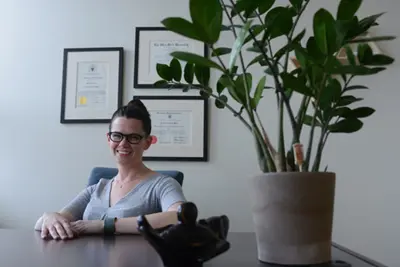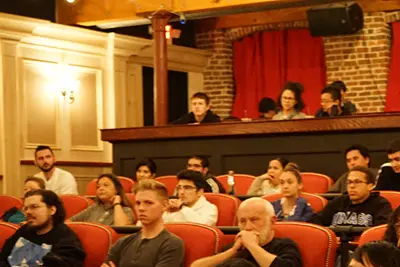Philosophy Professor Carol Hay Says COVID-19 Exposes Deep Inequalities

04/16/2020
By Katharine Webster
Rationing health care resources during a pandemic is a complex undertaking, says Assoc. Prof. Carol Hay of Philosophy.
What’s clear, though, is that COVID-19 is exposing deep inequities in access to health care and other basic resources that existed long before the pandemic arrived – and it presents an opportunity to address those inequalities, she says.
Hay, who teaches Introduction to Ethics every semester, became the first pre-tenure scholar to win the American Philosophical Association’s Gregory Kavka/University of California at Irvine Prize in Political Philosophy in 2015, widely regarded as the most prestigious prize in the field.
Her first book for a general audience, “Think Like a Feminist: The Philosophy Behind the Revolution,” will be published with W.W. Norton & Co. this September.
Recently, she spoke with us (remotely) about some of the urgent ethical questions raised by the pandemic.
Q: Different states and hospitals have come up with different guidelines for deciding who gets life-saving treatment in case of shortages. Nearly all of the plans prioritize children and pregnant women, and most prioritize front-line health care workers. Some favor young adults over older adults or those who were previously healthy over those with underlying conditions, based on the premise that younger and healthier people are more likely to survive. What do you think the priorities should be?
A: I think we need to admit that these are just really hard questions, and they might even be questions where there isn’t one answer.
One thing that’s important is that hospitals already have ethics boards, and these boards are trying to put policies in place so these decisions don’t need to be made by front-line medical staff in the moment. That’s essential for protecting the mental health of these doctors, who are used to being able to throw everything they have into saving a patient and aren’t used to – or trained in – making decisions about who gets that kind of care under conditions of rationing.
Q: Aren’t those front-line doctors the ones with the most information about who has the best chance to survive with a good quality of life?
A: Research shows that we tend to overestimate our ability to predict other people’s quality of life. Able-bodied people are especially bad at estimating the quality of life of people with disabilities, and it turns out that doctors are particularly bad at this. If you ask a person with a disability to rate their quality of life, they’ll usually rate it as highly as an able-bodied person would. Able-bodied people often think disabled people’s lives are completely miserable, and this just isn’t so.
There’s a concern that these pre-existing biases are slipping into hospital guidelines about who should be prioritized for care.
Maybe it makes sense that if you have certain pre-existing physical conditions or a terminal diagnosis, you’re going to be lower down the list for care. But there are those who suggest – wrongly – that people with mental disabilities aren’t worth as much. Disabilities rights activists have been arguing forever that we just can’t trust our gut in making these decisions.
I agree that children and pregnant women should probably get priority, but even here there’s a controversial assumption about the status of a fetus as a second person that has serious political ramifications for the pro-choice view. We should try to keep in mind that a lot of policies that seem really reasonable now might not look that way down the road.
I also have some concerns with policies that prioritize front-line health care workers. One argument for this is that when they get better, they can go back to providing care for others – but given the time scale we’re looking at with this virus, I’m not sure that’s going to be the case. Others argue that it’s more like a reward for them being heroes, but we’re asking cashiers at grocery stores to take similar risks with less protection, and they don’t get to jump to the front of the queue – and some of them don’t even have health insurance.
The bad health care-rationing policies are going to be those that let racist, sexist, able-ist and class biases slip in. I don’t think there’s one right policy. I think it’s probably good that different hospitals have different policies that address concerns in their community, like the hospital in Los Angeles that says celebrities shouldn’t get VIP treatment.
Yet when different hospitals have different policies, you’re going to get hospital shopping. People with resources are going to be able to do that, and people without resources aren’t.
Q: On the one hand, this pandemic seems like a great equalizer – everyone is vulnerable. On the other, it does seem to come down to resources. Homeless people, low-income people and people of color are getting severely ill and dying in much greater numbers.
A: You can’t shelter in place if you don’t have a place. Home isn’t a safe place to shelter for women and children at risk of domestic violence and for many LGBTQ people.
Seventy percent of people who are dying in Chicago are black. On the Navajo Nation reservation, more people have died than in the entire state of New Mexico, which has a population 13 times larger. Poverty and race map onto each other very closely in this country. And there are other ways the pandemic is exacerbating underlying inequalities, including that poor people are more likely to have chronic medical conditions that increase their risk of serious illness and death.
I think about those people who are escaping to their summer homes. Their circumstances are very different than if you’re crammed into a tiny apartment with a big family and your children don’t have a safe backyard to play in.
The people who were already vulnerable in our society are now even more vulnerable, and people who were privileged are still privileged. The pandemic exposes these inequalities so starkly that it’s hard to look away.
Q: As a moral and political philosopher, do you think this represents an opportunity to address some of these inequalities?
A: It would be great to chip away at some of these inequalities. Am I optimistic that’s going to happen? No. But it’s possible.
I do think many Americans are realizing, ‘Oh, wow! This is why universal health care is a good thing.’ Now that so many people are suddenly unemployed, people are realizing that it’s ridiculous that your health insurance is tied to your employment status and that it doesn’t have to be this way.
Other countries are seizing the opportunity to institute large-scale social reforms. Spain is rolling out a permanent universal basic income. People are starting to realize the importance of social safety nets; they’re starting to see how quickly our planet can start to recover from environmental degradation. It would be wonderful if this moment were to serve as a catalyst for positive change.
Q: What are our individual ethical responsibilities during a pandemic?
A: Many of our most pressing obligations right now are obligations of care: take care of yourself; take care of your family; take care of your community by not putting yourself or others unnecessarily at risk.
But there can also be this weird tension between protecting yourself and your family and protecting the community. We owe it to ourselves to stay safe and sane, and staying at home on your couch gets old fast. So all you want to do is go for a walk; all you want to do is go for a drive; all you want to do is get together with your friends. But every time you do, you’re putting the community at risk.
Still, I really don’t like a lot of the virtue-signaling I’m seeing on social media about who’s better than whom about social distancing, nor the shaming of those who can’t or won’t keep themselves so isolated. We don’t know what other people’s lives are like at home. It’s important not to judge others too quickly.
We need to appreciate just how much social distancing asks of people, and it’s fair to ask whether a proposed restriction is worth the costs. Some experts are saying you shouldn’t go for a drive because there’s a tiny chance you might get in an accident and hospitals are already overwhelmed. Some judges are recommending that children of co-parents who don’t live together shelter in place with only one parent for an indefinite period. These policies might make sense from a public health standpoint, but we need to consider the human toll they take and not expect people to just blindly follow every decree.
Q: What kind of philosophical advice can you offer students right now?
A: What I would say to them, if it’s any comfort, is that if they’re freaked out or they’re scared, they’re tracking. It’s such a strange time: We’re all together in this forced aloneness. It’s really worth pausing and reflecting on that.
This is also going to be the defining event of their generation, and they’re poised to bear the brunt of it, because a huge number of the unemployed are young people. They’re going to be living through the fallout, and it’s up to them to figure out what to do with that and how they want to move forward.




